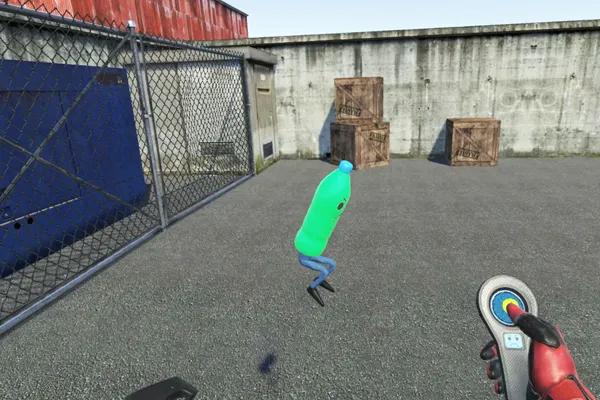Malaysia’s First Fully Immersive Recycling VR Game

Virtual reality gameplay: A player controls a plastic bottle to direct it into a recycling bin
The game was presented/experienced for the first time during the Malaysia’s biggest United Nations Concert/Event ‘Rock the Goals’ held on 25th September 2019 in Sunway University.The player’s task is to use the Virtual RC to control the character and force him to jump into the recycling container.

Crowd at the Rock the Goals United Nations SDG event in 2019 participating in Malaysia’s first fully immersive virtual reality recycling challenge
The experience includes multiple Unity Scenes guiding the users from start to finish in a win or lose outcome. The game was developed using SteamVR interaction system mainly for HTC Vive and WMR HMDs. The developer, Dr. Human Esmaeili, from the Centre for Research-Creation in Digital Media, School of Arts, Sunway University, who developed this game out as part of efforts form the Sunway Smart Sustainable Campus Committee to offer multiple approaches to education on sustainable development.

Malaysia’s first recycling virtual reality challenge gamifies recycling behaviour
VR games are known for their immersive experience. In this game, the player is tasked with controlling a plastic bottle. The player figures out the right pathway to complete the challenge. In this case, the player needs to figure out that the best option for the bottle is to be recycled. Using VR to inculcate recycling behaviour is an underutilized but powerful medium. Uptake of environmentally-friendly behaviours requires a change from existing behaviour. Using virtual reality as a platform to provide participants a recycling challenge is apt because it simulates the initial barriers faced when implementing recycling as a norm.

A player at the starting process of the game
The game’s choice of plastic has important environmental considerations. 55% of plastic waste in Malaysia ends up being littered in unregulated dumpsites and in waterways (Jambeck et al., 2015). Far less of the remaining amount is recycled, with landfills being the main destination for plastic waste rather than material recovery. The VR platform enables education on sustainable development to inculcate recycling behaviour through a task of managing trash effectively.

The VR recycling challenge simulates a recycling scenario to stimulate players to overcome the behaviour change required to recycle in their own lives
Virtual reality has been used in multiple fields as education tools in healthcare, environmental studies, astronomy and history. Environmentally-friendly behaviours have been communicated using the medium of augmented or virtual reality. These experiences are capable of providing an experiential participation in executing and learning about the ways to reduce human impact on the environment.
The immersiveness of virtual reality enables dedicated inculcation of a specific environmentally-friendly behaviour. Users are fully immersed in the completion of a recycling task. Motor coordination to effectively control the movement of a virtual element requires focused hand-eye-coordination between visual playing field and handheld controllers.
The experience of completion in this game is associated with successful recycling. As a game, the difficulty was high. Most users were unable to complete the task within the time stipulated.
For more information on the game and collaboration efforts please contact Dr Human Esmaeili (@email)
Reference:
Jambeck, J. R., Geyer, R., Wilcox, C., Siegler, T. R., Perryman, M., Andrady, A., . . . Law, K. L. (2015). Plastic waste inputs from land into the ocean. Science, 347(6223), 768-771.




